Editor’s Note: While the original is almost 30 years old, please note that this article does contain spoilers for the story of Final Fantasy Tactics!
The hero at the center of Final Fantasy Tactics: The Ivalice Chronicles is Ramza Beoulve. The son of a proud knight and scion of a noble bloodline, Ramza has all the makings of a grand hero, but that is not how history remembers him. Far from a gallant knight, he is remembered as a heretic who stood against the church. This erasure is by design. Ramza did embody all the virtues of a knight – he fought for the betterment of even those on the fringes of society and stood against corrupt powers – and in watching his story play out, it is hard not to think of the “heretics” of today’s politics.
It can feel gauche or out of place to do this, to tie the fictional fighting in Ivalice with the violence of the real world, but it’s not as if The Ivalice Chronicles’ creators are unaware of the fact that their beloved classic is releasing into a world of historic violence and ongoing political strife. In a much-cited statement made before the game’s release, Final Fantasy Tactics’ original director and scenario writer Yasumi Matsuno noted that, while he originally wrote the story during the time that Japan’s asset bubble-pop ushered in the Lost Decade, the remaster is also releasing into a world which is exceptionally charged and unstable.
“In 2025 – a time when inequality and division are deeply rooted in our society – I offer this story once again,” Matsuno said via social media. “The will to resist is in your hands.”
The world of Ivalice is rendered so vividly, it’s hard not to see Ramza’s tale as one applicable to the world it’s releasing into once again. As Delita Heiral, who began himself as a fellow knight, schemes his way through the war in order to both increase his own status and gain the power to end the conflict himself, Ramza proceeds with the earnest propulsion of a “traditional” RPG protagonist. History remembers Delita’s tale, honouring him as the commoner who rose to become king and unify the land, but a player’s journey through the Ivalice Chronicles reveals that it is Ramza’s honest chivalry – which time and time again leads him to speak out and confront those in power – which truly turns the tide of the war.
Here in our world, on 5th July of this year the United Kingdom’s parliament passed through a ban on Palestine Action, marking the direct-action protest organisation as a terrorist group. This came after multiple acts of protest against the ongoing Gaza war, including the vandalising of a Leonardo factory in Edinburgh and similar acts on university campuses, and breaking into the RAF base at Brize Norton to spray red paint onto two military aircraft. The parliamentary ruling criminalises fundraising and public shows of support for the organisation; 138 people have been charged for showing support for the group so far. The first three (arrested at an anti-war protest outside of Westminster) recently plead not guilty to criminal charges under the Terrorist Act.
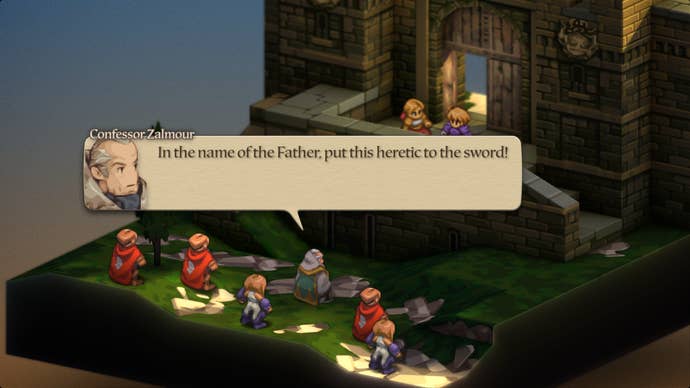
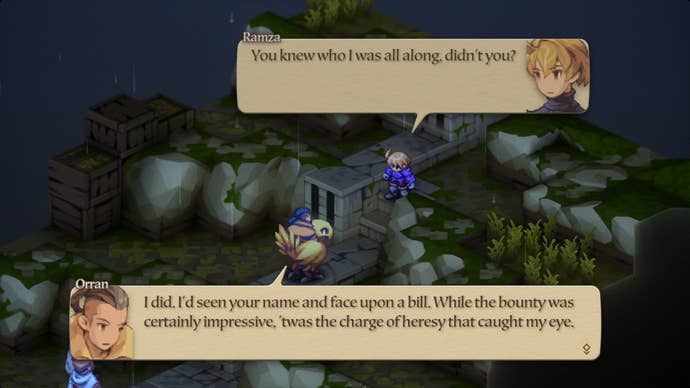
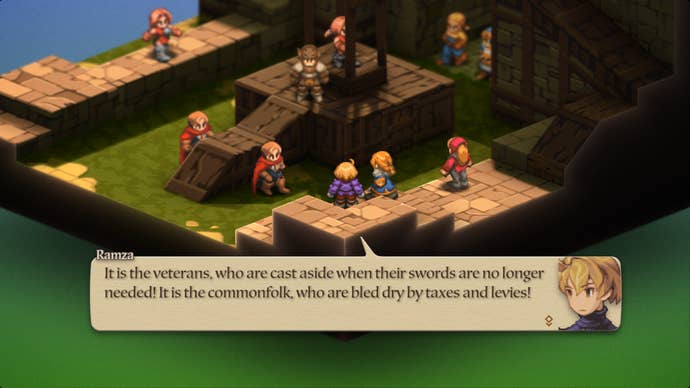
While the Hamas-led attacks in Israel on October 7th of 2023 were undeniably vicious and condemnable, the disproportionality of the casualties in the ongoing war in Gaza is equally undeniable. Official numbers state that 64,718 Palestinians have been killed in Gaza and 163,859 injured since the start of the war. Leaked Israeli intelligence data suggests that more than 80 percent of the dead as of May of this year were civilians. As a result of the violence experts have declared the region to be in a state of famine; this will lead to many more deaths. A recent United Nations commission of inquiry reported that Israel has committed genocide against Palestinians in Gaza, as did a collection of the world’s leading scholars on the matter.
We can debate the historical realities that lead to this moment, and we can condemn, if we so wish, the tactics of a group like Palestine Action. But the casualty numbers in Gaza continue to mount no matter how much we argue. Is it any surprise that people might gather to protest against this violence? We cannot know what lies in the heart of every one of the 138 people who have been charged for showing support for Palestine Action, but I suspect that a great many of these people were motivated to protest because of the simple truth that one group of people is being disproportionately slaughtered en masse. These protesters now face jail time.
Meanwhile, in the US, where I write from, there lie even more examples of individuals being punished for political speech. Following the murder of American political commentator Charlie Kirk, Ghost of Yotei developer Sucker Punch fired a senior developer over comments made about Kirk on social media. This is also a kind of heretical branding. While Kirk’s murder was a tragic act of reckless political violence, Kirk was himself a controversial figure in American politics who, among other things, questioned the qualifications and skills of Black Americans who were “prowling” around urban America, called on Taylor Swift to “submit to [her] husband,” and said he would require his 10-year-old daughter to carry a baby to term in the event that she was raped.
It is no surprise that someone might have complicated and perhaps not entirely flattering thoughts about the man, but to speak of those things, which an honest accounting of the man demands, means risk of broad censure. Maybe the better choice is to say nothing at all (it is certainly the safer choice right now), but to many people, saying nothing would not be honest to their character or their own beliefs.
Perhaps most prominently, in the land of American late-night television, comedian Jimmy Kimmel was temporarily removed from the airwaves in what was essentially government-lead censorship following comments about Kirk on his show. Kimmel had, during a time when the motives of suspected assassin Tyler Robinson were unclear, commented on the behaviour of those he called “the MAGA gang” and what he saw as a desire to “score political points” in the aftermath of Kirk’s assassination.
We should be clear that there was at least some truth to Kimmel’s words. In the aftermath of the killing, some provocateurs and even proper news outlets scrambled to suggest Kirk’s killer was a transgender person. We know this now to not be the case; the most clear thing we can say about Robinson is that he was an extremely online individual with all the muddy politics that entails. That and he, like most Americans, had quick and easy access to a gun.
This comment nevertheless drew what is now a historically significant amount of ire, not just from folks who felt Kimmel’s comments were ill-timed and disrespectful of the violent nature of Kirk’s death. It also drew them from government officials, who seem more than eager to make implicit threats about using the state’s power to silence the speech of anyone who didn’t meet the moment with politics that aligned with the current regime.
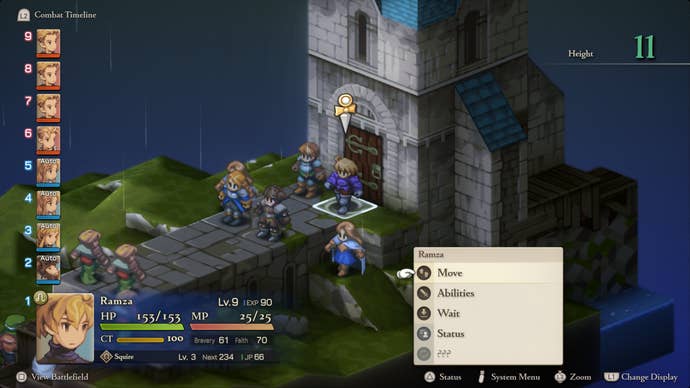
When talking about the potential for revoking television broadcast licenses for providers that host Kimmel’s show, United States Federal Communications Commission chairman Brendan Carr said: “We can do this the easy way, or the hard way.”
What does all that have to do with chocobos and black mages? These people, like Ramza, are examples of the “heretics” of today. Our world might not be one of warring dukes, like Ivalice, but it is still one where standing against the tides of war can leave you a marked person. When I look at the world around me, one where protestors are charged with crimes and where creatives and journalists lose jobs for refusing to ignore hard truths, I see echoes of Ramza Beoulve. On face value that might sound silly, but truly great pieces of art reach out – and make this kind of connection-making unavoidable.
“Mayhaps you forget the ease at which men are branded heretics,” a villain warns in one scene of The Ivalice Chronicles. He makes this threat in order to convince a highwayman to ambush Ramza. The threat of social ostracisation by the church and ruling state officials is enough to drive the bandit to attack Ramza and his allies. Meanwhile, in my reality, the vaguest threat from the FCC to take action against major TV operators – some of whom rely on FCC goodwill to approve upcoming business mergers – was enough to get them to bend the knee.
Ramza’s story, as told in Final Fantasy Tactics, has a certain romantic idealism. Working initially to untangle the truth behind the kidnapping of a princess, he slowly finds himself opposing both sides of the “War of the Lions.” When asked why he stands against these forces, he speaks first of those harmed by the war. He does not fight to serve a liege but rather “the veterans, who are cast aside when their swords are no longer needed” and “the commonfolk, who are bled dry by taxes and levies.”
These words are dismissed often by other characters in the story – chiefly Ramza’s friend Delita Heiral – as childish, but as the story progresses and Ramza is marked outright as a heretic by Ivalice’s Church of Glabados, it is clear that this uncomplicated and uncompromising outlook at the war is one that the ruling powers find existentially threatening. And while the real world lacks princesses and spell-slinging swordsmen, it doesn’t lack for people who seem threatened by uncomplicated and uncompromising outlooks on war.
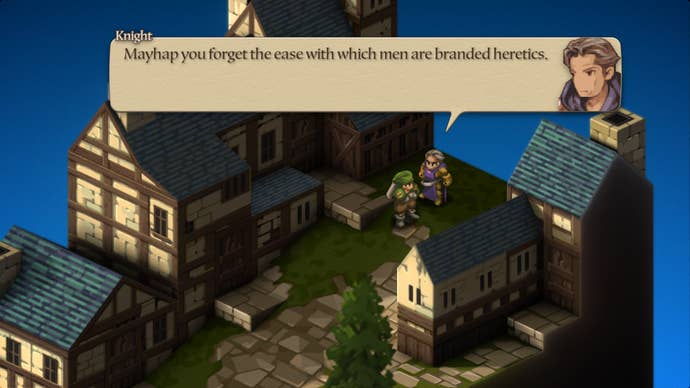
And so if Matsuno offers a model for how to resist, it is Ramza. The world around him might be one of shadows and plots, but Ramza consistently does the honest thing. And while his reward is to be branded a heretic by the powers that control Ivalice, Matsuno is also at pains to show the wider impact of Ramza’s frankness on that world. It allows him, for instance, to uncover a plot that Delita makes little effort to stop; as Delita oath-breaks his way through noble houses and towards his own kingdom, Ramza discovers that there are demons at the center of the war: a cadre of lords and clergymen, who fan the flames in order to search for powerful “Zodiac Stones” offering incredible powers. These stones react to the power-cravings of desperate men, invariably transforming them into said demons. Demons that the player obviously needs to dispose of in crunchy tactical boss fights! (Which, for the record, are still great nearly 30 years later.)
When we discover that someone like the Glabados Church’s Cardinal Delacroix hides one of the Zodiac Stones, the twist is not that he’s possessed by a demon the entire time. The twist is that the stone, once he calls out to it in a bid to eliminate Ramza, simply transforms Delacroix into a form befitting his true nature. The stone did not make him this way, nor has his nature been twisted. To seek political power, to seek military might, you already need to be a demon. Ramza’s “childish” drive for justice simply pulls these people into the open and makes their viciousness impossible to hide.
The chivalry at the core of Ramza’s character is one we find in all activists who take to the streets, even if they might end up in jail as a result. If we want to resist, this game says, then we need to do so. Who else will speak for the “commonfolk” if not us? It is through direct confrontation with evil – or at least cruelty and corruption, here in our world – that we draw it out of our institutions into the light and reveal it to the world. Delita and his politically pragmatic ways could never achieve this. He can claim the throne and win in the realm of politics, but it is the idealistic path that Ramza walks which ultimately redeems Ivalice.
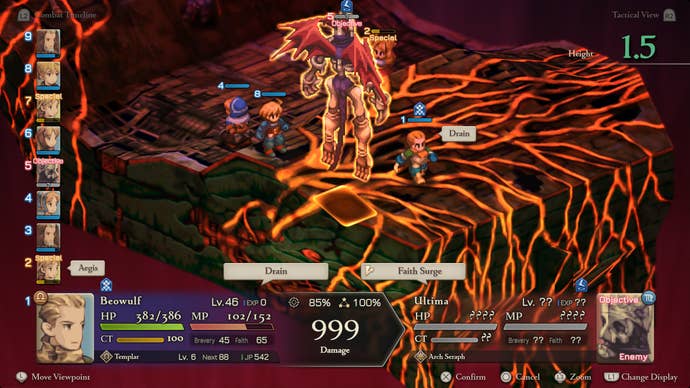
Final Fantasy Tactics lives within a frame. The story is being recounted by a “modern” historian named Arazlam Durai. He is reading from the Durai Papers, an account of Ramza’s story written by his ancestor Orran Durai, who the player meets during the game. Orran himself was burned at the stake as a heretic for presenting these papers, at a church conference after the main story concluded. Just as Ramza’s path diverges from Delita’s, Orran is tried and killed simply for revealing the truth.
None of our current world, of course, was on Matsuno’s mind when he wrote this tale so many years ago, but it’s hard not to feel that Ramza is an even more resonant hero in 2025 than he was back in 1997. All you need to do, to see the “ease at which men are branded heretics”, is open your morning newspaper. Yet the revelation of this story now, from Arazlam to the player, holds hope: that in time history does recognise the “truth” of a matter. That even the small and perhaps invisible acts of goodness, which often seem overshadowed by the sheer power of status quo institutions, are sharp enough to eventually cut a path towards a better future. That while courthouses and churches and other institutions can last a long time, justice and truth will outlast them. All the more reason to stand for those principles, regardless of what they might call you.
Source link
